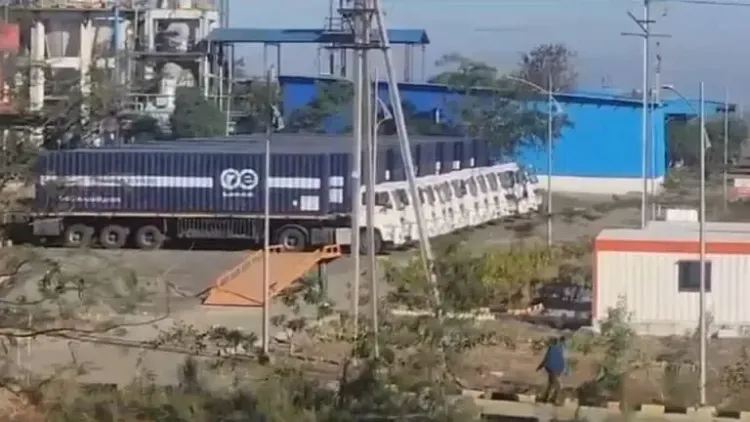Completion of Initial Phase in Union Carbide Toxic Waste Disposal; Next Phase Launches Today

Synopsis
Key Takeaways
- First phase of toxic waste disposal completed.
- Second phase processes 10 tonnes at a rate of 180 kg/hour.
- Waste has been stored for 40 years since the 1984 disaster.
- Supreme Court declined to intervene in the disposal process.
- Legal challenges highlight environmental and health concerns.
Bhopal, March 4 (NationPress) Following the successful conclusion of the first phase in the disposal of toxic waste from Union Carbide, the government of Madhya Pradesh is set to initiate the second phase tomorrow.
This January, 337 tonnes of toxic waste were securely transported from Bhopal to Indore in sealed containers, with the first trial run reportedly completed without any hazardous incidents.
The upcoming phase will involve processing a batch of toxic waste at a rate of 180 kg per hour over a span of 55 hours, targeting a total of 10 tonnes.
This toxic waste has been stored at the abandoned facility of Union Carbide India Pvt Ltd for 40 years, dating back to the world's most catastrophic industrial disaster on December 2, 1984.
The second phase's trial run will occur at the same private site in Pithampur, located in Dhar district. A government representative has stated that a significant police presence will be maintained, despite the peaceful completion of the first phase. During that phase, a total of 10 metric tonnes of waste was incinerated over 74 hours.
On February 27, the Supreme Court opted not to interfere with the incineration trial process and dismissed petitions from individuals and social organizations.
As a result, the government immediately initiated the trial run process the following day. Following a directive from the Madhya Pradesh High Court, the waste was transported from Bhopal to Pithampur for incineration at a private facility.
However, legal challenges temporarily stalled the disposal for 56 days. The High Court issued an order banning “fake news” that was inciting panic among residents of Pithampur and Tarpura village, where the facility is based. Residents expressed concerns that the toxic waste disposal could present severe health dangers.
Numerous public interest litigations have been submitted to the principal bench of the Madhya Pradesh High Court.
In December 2024, the High Court mandated the disposal of 337 tonnes of toxic waste. However, NGOs contested this process, claiming that the state government misrepresented information to secure permission for disposal. Their primary argument is that the state is breaching the 'Water Protection Act 1974'.
They also argue that disposing of such large quantities of waste presents significant environmental hazards.
Nevertheless, the state government asserts that the collection, transportation, and disposal of the waste have complied with regulatory standards. The state plans to pay Rs 126 crore to the private facility for their services.








